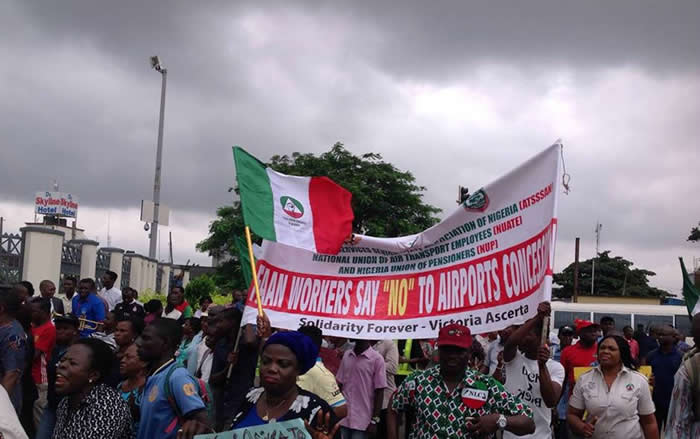The Nigerian Meteorological Agency (NiMet) is facing a renewed threat of industrial action from three major aviation unions, just months after a previous strike was suspended. The National Union of Air Transport Employees (NUATE), the Association of Nigeria Aviation Professionals (ANAP), and the Amalgamated Union of Public Corporations, Civil Service Technical and Recreational Services Employees (AUPCTRE) have jointly accused NiMet’s management of reneging on a collective bargaining agreement signed in January 2025. The unions express deep disappointment and frustration with the agency’s failure to uphold its commitments, raising concerns about the erosion of trust and the potential for renewed disruption to aviation services.
Central to the unions’ discontent is the alleged non-implementation of a promised allowance, which NiMet management committed to negotiate and implement by the end of February 2025. Despite the passage of over a month beyond the agreed deadline, the unions claim no progress has been made, and the management has offered no explanation for the delay. This perceived breach of trust has amplified existing grievances stemming from the January agreement, further fueling the unions’ resolve to take action.
Beyond the unfulfilled allowance, the unions highlight several other unresolved issues, including the alleged withholding of the negotiated conditions of service document from union signatories. Suspecting foul play, the unions have repeatedly requested access to the document but have been met with resistance from NiMet management. This lack of transparency has deepened the divide between the two sides, hindering efforts to build a foundation of trust necessary for productive negotiations.
The unions also express concern over the lack of progress on crucial financial entitlements agreed upon in the January agreement. These include a 25-35% wage increase, a 40% peculiar allowance, nine months of outstanding arrears from the 2019 minimum wage implementation, and the inclusion of 30 omitted names from the 2019 minimum wage payment list. The unions’ frustration stems from the perceived inaction on these issues, which directly impact the financial well-being of NiMet employees.
Further complicating the situation is the unions’ contention that NiMet management prioritizes executive retreats over essential training commitments for senior staff. While acknowledging the importance of leadership development, the unions argue that these retreats come at the expense of crucial training for other staff members, particularly those in grades GL10-14. This perceived misallocation of resources adds another layer of complexity to the already strained relationship between the unions and management.
The unions describe the situation as “troubling and worrisome,” highlighting the significant efforts they made to avert the previous strike in January. They accuse NiMet management of squandering the goodwill demonstrated by the unions’ willingness to suspend the planned industrial action and engage in peaceful negotiations. This breakdown in trust is a major obstacle to finding common ground and resolving the ongoing dispute.
To underscore their seriousness, the unions have issued a new deadline of Wednesday, April 6, 2025, for NiMet management to fully implement all aspects of the January agreement. Failure to comply, they warn, will result in the resumption of the suspended strike without further notice. This ultimatum raises the stakes and puts pressure on both sides to find a resolution before the deadline expires.
NiMet employees, speaking on condition of anonymity, have corroborated the unions’ claims, painting a grim picture of their financial struggles. They confirm that the promised 25-35% wage increase, though reportedly approved, has not been paid. Furthermore, they highlight the ongoing hardship caused by the incomplete implementation of the 2019 minimum wage, with nine months of arrears still outstanding. The N40,000 peculiar allowance announced by the Federal Government for all civil servants also remains elusive for NiMet staff.
The recently approved new minimum wage adds another layer of uncertainty and frustration. While the approved document and template have been sighted, NiMet employees remain unaware of the implementation timeline. Coupled with the unpaid arrears and allowances, this uncertainty exacerbates their financial anxieties, affecting their ability to meet basic needs like school fees and rent.
The employees’ testimonies underscore the human cost of the ongoing dispute, emphasizing the financial strain and emotional toll on NiMet workers and their families. Their pleas for intervention from government authorities and well-meaning Nigerians highlight the urgency of the situation and the need for a swift resolution to alleviate their suffering.
The historical context of the dispute, tracing back to the 2019 minimum wage implementation, underscores the long-standing nature of the grievances. The partial payment of arrears in August 2024, covering only 34 out of 43 months owed, further fueled the workers’ discontent. The subsequent introduction of a 25-35% wage increase under the current administration, which remains unpaid, and the discontinuation of the N35,000 wage support after February 2024, have only exacerbated the situation.
The skepticism surrounding the approval of the new minimum wage, coupled with the reported exclusion of NiMet from the budget, casts doubt on the government’s commitment to addressing the workers’ concerns. This perceived lack of sincerity further erodes trust and fuels the workers’ agitation. The prevalence of loans among NiMet staff, taken out to cope with financial hardship, underscores the severity of the situation and the urgent need for intervention.
The January ultimatum issued by the unions, threatening a nationwide industrial action, serves as a stark reminder of the potential consequences of the ongoing dispute. The unions’ directive to withdraw all services unless the issues are addressed within 14 days demonstrates their resolve to take decisive action to protect their members’ welfare. The current renewed threat of a strike looms, further emphasizing the urgency of finding a mutually acceptable solution to avoid disruptions to aviation services.














